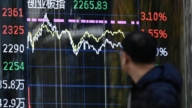【新唐人2013年03月26日訊】近年來,中國環境問題愈演愈烈,中共兩會期間,不僅毒濃霧重鎖北京,上海黃浦江還出現上萬頭死豬。有媒體形容,中國出現末日般景象。而擔任8年的環保部長周生賢,卻在新一屆領導班子部長級任命時,保留了職位。引發中國網友炮轟。
當年揭露非典疫情的中共人大代表鐘南山,今年在中共的兩會上感嘆:「人最關鍵的需要,一個是呼吸的空氣,一個是吃的食物,一個是喝的水。這些在中國都不安全,甚麼幸福感都沒有了。」
而美國《紐約時報》說,兩會中共國家領導人換屆時,中國出現了一片末日般的景象。給上海提供飲用水的河流中發現1萬3千多頭漂流的死豬。而類似於火山煙霧的霧霾籠罩著首都。
但是,在3月16號的中共人大代表會議上,周生賢卻以最低支持票,保留了他環保部長的職位。
有網友質問,如果一條江裡都是豬,其它河流已乾涸,城鎮籠罩在霧靄之中,數百萬人罹患與粉塵相關的肺部疾病,這些算不算是環境部長的功勞?
另有網友細數週生賢在任8年的「成就」,其中有:
2006年在甘肅徽縣的鉛污染;2007年太湖爆發藍藻;2010年紫金礦業污染;2011年康菲石油原油洩漏;2012年廣西鎘污染和北京的霧靄;2013年,山西的苯胺洩漏,山東的地下水污染和上海的死豬潮。
大陸網友王先生:「環保部是查哪個地方有污染,它應該進行處罰的,但是因為它腐敗了,也許它拿著這個做由頭,他去收錢去,只要給他錢,他就可以不罰,可以睜一只眼閉一只眼,從上到下都是這樣。」
大陸的這名王姓網友還指出,凡是製造污染的大企業,他們的利益都跟當地的官員掛著鉤。
王先生:「那麼跟當官的利益有勾結了,他能去查嗎?真正大的查不了,小的他也要認錢,就跟質檢總局下去查產品質量問題,包括工商總局查這些問題一樣,給錢就行,他們就只認錢。」
北京環保人士戴晴指出,中國環境問題變成現在這個狀況,所有中國民眾,包括中共人大代表都憤怒了。但是環保部那幫人,他們還是以當官為重,並不是以保護環境為職志。
北京環保人士戴晴:「我好好當我的官,我好好拿我的高工資,我好好享受我的各種官員待遇,我努力做到,起碼在口頭上要說,要保護環境,也制定一些政策,公布一些法規,但是他無能為力的時候,他絕對不會捨棄當官的任何好處。」
3月上旬,美國國家經濟研究局發佈一篇論文,作者通過對中國283個地級市的研究,發現中共地方官員花錢治理污染後,一般會陞遷無望;而那些花大錢,造高速公路和其它交通基礎設施,同時以環境為代價,增加GDP的官員卻更有可能陞官。
中共不但獎勵污染環境的官吏,同時還阻止民眾自發保護環境。相關數據顯示,自1996年以來,中國因環境問題引發的大規模群體事件,每年增加的速度達到29%。
從廈門、寧波到大連的二甲苯(PX)化工項目;以及,從甚邡鉬銅項目;到啟東王子造紙排污項目,中共地方和廠商勾結,強制興建污染工程,導致民眾走上街頭抗爭,中共則派出軍警血腥鎮壓。
旅美的中國時政評論專家伍凡認為,中國生態環保的惡化,將會造成人民的揭竿而起。
政論家伍凡:「生態環保越來越壞,這事牽扯到所有的人,不管你有錢沒錢,有權沒權,統統牽扯進去了,這是一個最能夠激動人心,要結束共產黨專政的。」
伍凡指出,中國的環境污染,就像中共的貪腐一樣,多存在一天,多污染一天。當威脅到中國老百姓生存的時候,中共倒臺也就指日可待了。
採訪/陳漢 編輯/李韻 後製/李月
China: Pollution Worsening, Environmental Minister Keeps Job
China’s environmental deterioration
has intensified in recent years.
During the Chinese Communist Party(CCP)
Two Sessions, an extensive haze engulfed Beijing.
In Shanghai, over 10,000 dead pigs
were found floating in the Huangpu River.
Media have described how China
presents a doomsday scenario.
During the state leadership transition, Zhou Shengxian
held onto his seat as environmental protection minister.
Zhou has held the position for eight years, and has
become a target of criticism by Chinese netizens.
Media reported remarks from Zhong Nanshan, a
Deputy of the National People’s Congress (NPC).
He said: “The most important factors for
human survival are air, food, and water.
But they are all unsafe in today’s China,
which has driven away all happiness.”
The New York Times reported that China’s state leadership
transition took place “against an ominous backdrop”.
“Over 16,000 dead pigs have been found floating
in rivers that provide drinking water to Shanghai.”
“A haze akin to volcanic fumes cloaked the capital.”
On March 16, Zhou Shengxian held onto his
post with the lowest number of NPC votes.
A netizen asked, “when a river was covered
with dead pigs, while many others have dried up,
when cities are blanketed in smoke haze, while millions
of people have contracted dust-related lung disease,
should these be counted as the credits of the
environmental protection minister, or shouldn’t they?”
Another netizen cited major “achievements” that
Zhou made during his previous eight-year tenure.
In 2006, lead contamination in Huixian County, Gansu.
In 2007, a catastrophic blue-green
algae outbreak in Taihu Lake, Jiangsu.
In 2010, Zijin Mining’s pollution spill in Fujian.
In 2011, oil spills in Bohai Bay.
In 2012, cadmium pollution in
Guangxi, and thick haze in Beijing.
In 2013, aniline leakage in Shanxi.
In addition, groundwater pollution in Shandong,
and massive numbers of dead pigs in Shanghai rivers.
Mr. Wang, China netizen: “The environmental protection
ministry should’ve punished those sources of pollution.
But it’s too corrupt, so it may use them
as pretexts to collect money instead.
As long as it gets money, it’ll ignore the
pollution, which is its top-down practice.”
Mr. Wang adds that all polluting enterprises
have linked their interests with local officials.
Mr. Wang: “So after they have colluded with the officials,
will the officials really investigate and punish them?
For the large polluting enterprises, the
authorities won’t investigate seriously.
For the small ones, money can always get things straight.
The quality supervision authorities just
do the same, as all they want is money.”
Beijing environmentalist, Dai Qing, comments that
China’s worsening environment has aroused public fury.
Yet, for the CCP environmental protection officials,
they only focus on how to ensure they keep their posts.
Dai Qing: “They just think of keeping their jobs,
getting well paid, and enjoying all-sided welfares.
They will verbally promote environment protection, and
may even release some polices and regulations on it.
But when they fail to deal with situations, they’ll only
think of keeping their positions first and foremost.”
In early March, the National Bureau of Economic
Research of the US released a working paper.
It was based on 283 municipalities in China.
It stated that the officials’ promotion is unrelated
to their work achievements of dealing with pollution.
Rather, it is related to their boosting GDP, by building
highways and other transportation infrastructure.
In reality, the CCP regime has rewarded
its officials for not controlling pollution.
Also, it has blocked civilians’ voluntary
actions for environmental protection.
Public data shows that since 1996, environment
driven mass protests have increased by 29% annually.
They included mass protests against PX
projects in Xiamen, in Ningbo and in Dalian.
It also includes the molybdenum copper project in
Shifang, and Oji Paper mill’s sewage project in Qidong.
Collusions between local CCP authorities and businesses
initiated these polluting projects, resulting in mass protests.
The CCP sent soldiers and police to suppress them.
Critic Wu Fan says that the deterioration of China’s
environment will finally force civilians to rise up.
Wu Fan: “The environment in China has worsened.
It has affected everyone, the rich and
poor, the privileged or disadvantaged.
This is the highest stimulant that
may contribute to the CCP collapse.”
Wu Fan compared China’s environmental pollution to the
CCP corruption, as the longer it exists, the more it pollutes.
When it endangers people’s survival, the day of the
CCP’s downfall is around the corner, Wu Fan remarks.



























